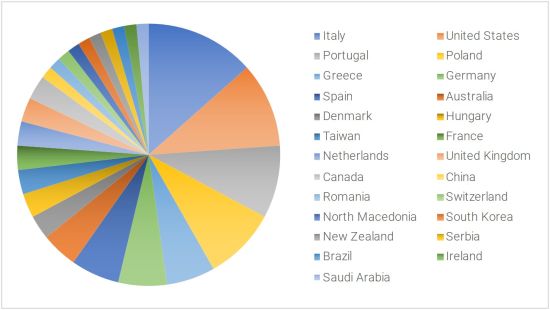Search Articles
Journal:
all
Total
—
88 articles
Article 7 Feb 2024
Tsz Hin Hui, Nadine Itani and John F. O’Connell
8316 Views3496 Downloads5 Citations
Article 2 Feb 2024
Nipun Goyal and Mahdi Mahmoudzadeh
This article is part of the Special Issue Capturing the Sustainable Impact of Early-Stage Business Models.
Highlights of Sustainability
Volume 3 (2024), Issue 1, pp. 46–60
Volume 3 (2024), Issue 1, pp. 46–60
3258 Views757 Downloads
Article 29 Jan 2024
Manuel Rodeiro
Environmentalists have long claimed it is unjust for the state to prioritize economic interests over environmental ones by sacrificing ecosystem integrity and functioning to unsustainably expand the economy. Recently, mainstream environmentalists have moved to a more
Environmentalists have long claimed it is unjust for the state to prioritize economic interests over environmental ones by sacrificing ecosystem integrity and functioning to unsustainably expand the economy. Recently, mainstream environmentalists have moved to a more conciliatory approach highlighting the common ground between environmental and economic goals. They today claim processes of economic growth and development can be made just if they become green. This paper explores the question: should states pursue “green growth”? Although some critics claim green growth is impossible, I maintain it is. I theorize three conditions that must be met for an instance of growth to be truly considered green. That a development project is green, however, does not automatically ensure it is just. Justice considerations remain in adjudicating the competing interests of different groups of stakeholders. I then examine four reasonable approaches to resolving controversies over the pursuit of green growth: cost-benefit analysis, sufficientarianism, democracy, and pluralism. I conclude a liberal pluralist form of decision-making is best for ensuring fairness.
or
Access Full Article
Highlights of Sustainability
Volume 3 (2024), Issue 1, pp. 33–45
Volume 3 (2024), Issue 1, pp. 33–45
2847 Views834 Downloads2 Citations
Article 5 Jan 2024
Athanasios G. Giannopoulos and Tatiana P. Moschovou
Highlights of Sustainability
Volume 3 (2024), Issue 1, pp. 16–32
Volume 3 (2024), Issue 1, pp. 16–32
2791 Views899 Downloads
Article 28 Dec 2023
Majbah Uddin, Nathan N. Huynh and Fahim Ahmed
Highlights of Sustainability
Volume 3 (2024), Issue 1, pp. 1–15
Volume 3 (2024), Issue 1, pp. 1–15
2996 Views760 Downloads2 Citations
Editorial 21 Dec 2023
Highlights of Sustainability Editorial Office
Highlights of Sustainability
Volume 2 (2023), Issue 4, pp. 303–304
Volume 2 (2023), Issue 4, pp. 303–304
2312 Views396 Downloads
Article 20 Dec 2023
Mouna Samaali, El-Hassane Aglzim, Xavier Dessertenne and Patrick Dubreuille
This article is part of the Special Issue Feature Papers to the Inaugural Volume of Highlights of Vehicles.
Highlights of Vehicles
Volume 1 (2023), Issue 2, pp. 68–85
Volume 1 (2023), Issue 2, pp. 68–85
2856 Views915 Downloads
Article 16 Nov 2023
Mahdi Mahmoudzadeh
This article is part of the Special Issue Capturing the Sustainable Impact of Early-Stage Business Models.
Highlights of Sustainability
Volume 2 (2023), Issue 4, pp. 283–302
Volume 2 (2023), Issue 4, pp. 283–302
2789 Views1218 Downloads
Article 15 Nov 2023
Irina Di Ruocco
This article is part of the Special Issue Capturing the Sustainable Impact of Early-Stage Business Models.
Highlights of Sustainability
Volume 2 (2023), Issue 4, pp. 259–282
Volume 2 (2023), Issue 4, pp. 259–282
3227 Views1211 Downloads1 Citations
Article 11 Nov 2023
Sevasti Malisiova and Stella Kostopoulou
Highlights of Sustainability
Volume 2 (2023), Issue 4, pp. 241–258
Volume 2 (2023), Issue 4, pp. 241–258
3819 Views1017 Downloads1 Citations

Volume 3 (2024), Issue 1, pp. 61–75